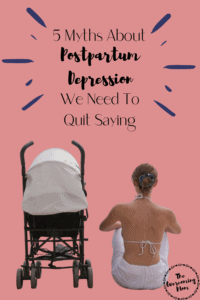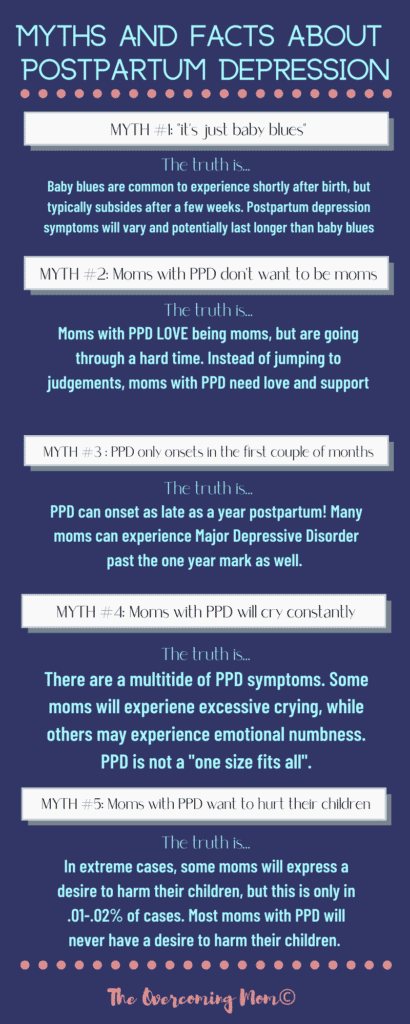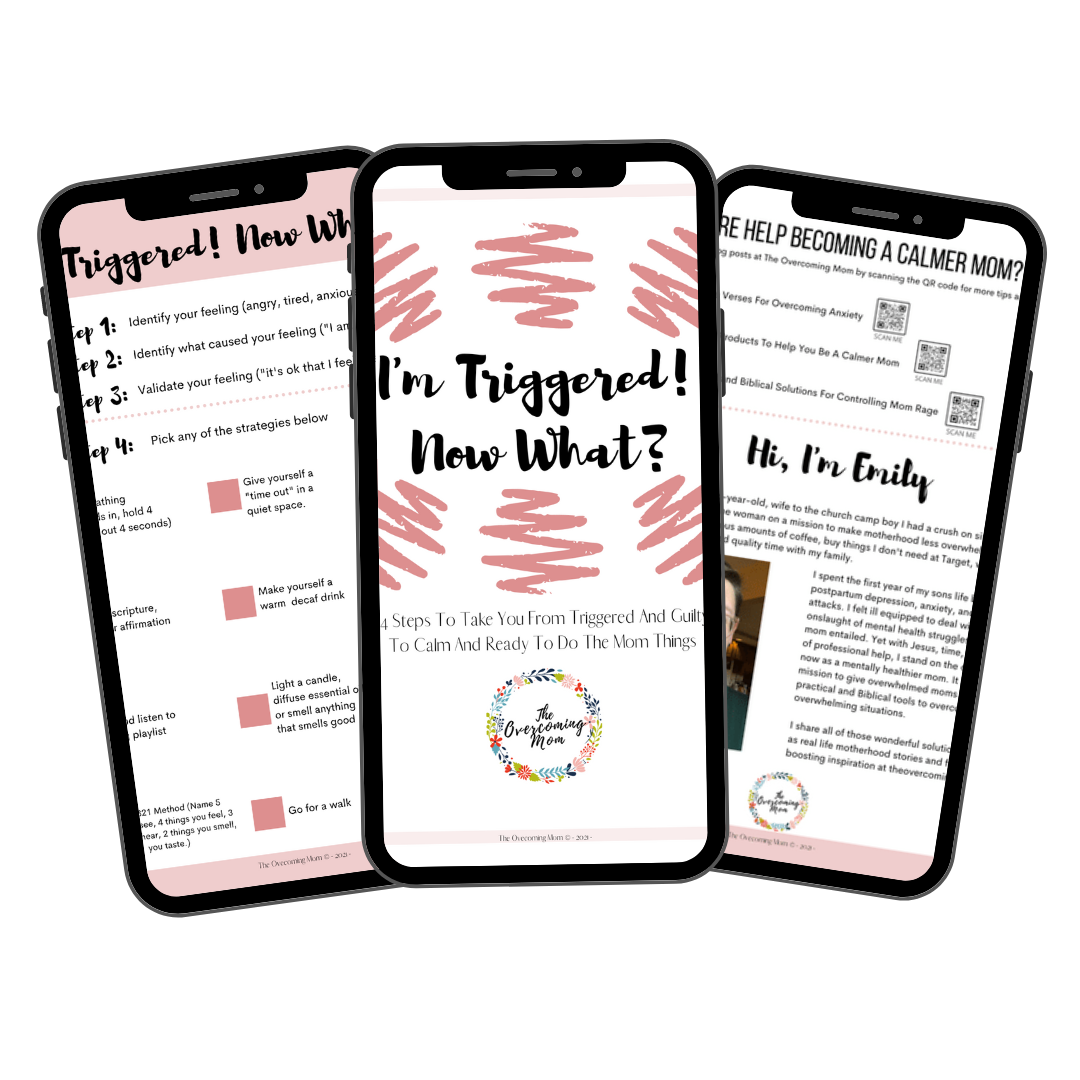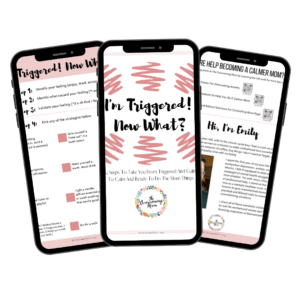This page may contain affiliate links. As an Amazon Associate I earn from qualifying purchases. If you want more information, please see my Affiliate Disclosure.
I vividly remember watching an episode of Daredevil on Netflix that talked briefly about postpartum depression. It was an episode where Matt Murdock, the main character, met his biological mother. When she told the story of why she didn’t raise him, the camera showed a young woman staring off into space, letting her infant child scream in a bassinet, while mystery men whisked her son away from her.
As a young woman who actually had postpartum depression, this narrative ticked me off.
In my humble opinion, this painted the picture of mothers battling postpartum depression as neglectful, not wanting to be moms, unmoved by the screams of our children, and disinterested in motherhood. A beautiful opportunity to paint the deep nuances of maternal mental health was missed out for the sake of creating shock value.
In fact, I feel many Hollywood accounts of postpartum depression paint a narrow picture. It doesn’t help that in America, mothers are screened for postpartum depression only once at 6 weeks postpartum, and are many times unaware of the complexities of perinatal mental health.
This is why dispelling the myths of postpartum depression is vital. Educating yourself on the complexities of maternal mental health can save you or a loved one from enduring unnecessary pain. These 5 postpartum depression myths are ones I have either heard personally or have been told to others. We need to disprove these myths and remember the truths in order to help ourselves and others through this trying time of motherhood.

Myth #1: It’s just baby blues
Baby blues are a common issue many new moms may feel. According to the Mayo Clinic, symptoms of baby blues will arise a couple days after having a baby, but typically subside after a couple weeks. Symptoms of baby blues can be:
- Mood swings
- Anxiety
- Sadness
- Irritability
- Feeling overwhelmed
- Crying
- Reduced concentration
- Appetite problems
- Trouble sleeping
Postpartum depression differs in the severity of symptoms and how long symptoms can last. Many women can experience postpartum depression for well over a year! In my personal case, I dealt with postpartum depression for a year and a half. According to The Mayo Clinic, some of the symptoms of postpartum depression can include:
- Depressed mood or severe mood swings
- Excessive crying
- Difficulty bonding with your baby
- Withdrawing from family and friends
- Loss of appetite or eating much more than usual
- Inability to sleep (insomnia) or sleeping too much
- Overwhelming fatigue or loss of energy
- Reduced interest and pleasure in activities you used to enjoy
- Intense irritability and anger
- Fear that you’re not a good mother
- Hopelessness
- Feelings of worthlessness, shame, guilt or inadequacy
- Diminished ability to think clearly, concentrate or make decisions
- Restlessness
- Severe anxiety and panic attacks
- Thoughts of harming yourself or your baby
- Recurrent thoughts of death or suicide
As you can tell from the differences in symptoms, what makes postpartum depression and baby blues different is the severity of symptoms and how long one can experience them.
As always, if you find yourself battling postpartum depression, I always recommend seeking out professional help. If you are a Christian and you’re on the fence about whether professional help is for you I recommend checking out my blog post, “Should Christians Go To Therapy?”
Myth #2: If you’re depressed, you must not have wanted to be a mom in the first place
This myth is just plain mean! Unfortunately, I’ve heard it personally and it’s been said to many mothers.
There are many reasons why a mom might experience postpartum depression. According to Postpartum Support International, risk factors of postpartum depression can include:
- A personal or family history of depression, anxiety, or postpartum depression
- Premenstrual dysphoric disorder (PMDD or PMS)
- Inadequate support in caring for the baby
- Financial stress
- Marital stress
- Complications in pregnancy, birth or breastfeeding
- A major recent life event: loss, house move, job loss
- Mothers of multiples
- Mothers whose infants are in Neonatal Intensive Care (NICU)
- Mothers who’ve gone through infertility treatments
- Women with a thyroid imbalance
- Women with any form of diabetes (type 1, type 2 or gestational)
In case you didn’t notice, none of those reasons are because the mothers didn’t want to be mothers.
In my personal case, I struggled with gestational diabetes, a personal history of depression and anxiety, breastfeeding complications, and I had a pretty traumatic birthing experience. I never thought once about not wanting to be a mother! I have listened to story after story of mothers who fought to become pregnant, only to develop postpartum depression, or mothers whose children ended up in the NICU, and later on developed postpartum depression. None of these women didn’t want to be moms! They’re simply moms who were dealt a difficult hand and need help coping and recovering from understandable trauma. These moms don’t need to be shamed, they need to be supported.
This myth keeps many moms from seeking the help they desperately need. Which is why it is so important to dispel this myth!
Myth #3: Postpartum depression only happens in the first couple months
I didn’t experience my first panic attack until four months postpartum. My first few months home were so joyous! I LOVED being home with my baby! But when I returned to work, everything changed. My son started the dreaded 4-month sleep regression the night after my first day back at work. I had my first panic attack that night.
Lack of sleep was fine for me to have when I was home, but returning to my stressful teaching career with little to no sleep was triggering. I convinced myself I was “just tired,” but months later when my son was sleeping through the night, the depression continued. The panic attacks became increasingly worse, even with adequate rest.
If postpartum depression only happened in the first couple months, then I should have been fine.
The truth is, many moms can experience postpartum depression symptoms up to a year after having their baby. With that being said, I wonder why doctors only screen for postpartum depression 6 weeks after birth?
This is why it is vital to check up on moms, and not just weeks after having a child. Ask your mom friends how they’re doing, even when their baby is walking. Check up on your mom friends when the terrible twos enter their home. Being a mom is tough, not just for the first 6 weeks.
Myth #4: You’re crying constantly
The truth is, some moms will cry a lot. I cried quite a lot. But many people with clinical depression (not just postpartum) will not experience excessive crying.
There seems to be a picture of postpartum depression painted by Hollywood of weepy mothers letting their babies cry in bassinets while a loved one waves their hand in front of their face and asks why they’re not doing anything. To put it very plainly, being depressed doesn’t mean you cry all the time!
In fact, many people with depression will experience a lack of emotion or a feeling of emptiness. Some people will experience fatigue. Some will also experience more rage than tears. Postpartum depression doesn’t look the same on everyone.
Once again, this is why it is vital that we listen to mothers and understand all symptoms. Just because some moms will be weepy doesn’t mean that the mom whose too exhausted to cry is fine. Both moms need to be taken seriously.
Myth #5: You don’t love your child or you want to hurt them
This is similar to Myth #2. Many moms feel the need to explain that though they are experiencing postpartum depression, they still love their kids and they still want their kids. This is something a mom should not have to explain.
There is a difference between postpartum depression and postpartum psychosis. Unlike postpartum depression, moms with postpartum psychosis can experience more severe symptoms such as:
- Delusions or strange beliefs
- Hallucinations (seeing or hearing things that aren’t there)
- Feeling very irritated
- Hyperactivity
- Decreased need for or inability to sleep
- Paranoia and suspiciousness
- Rapid mood swings
- Difficulty communicating at times
Postpartum psychosis is a rare illness (occurring in about .1-.2% of births), but can be very severe. But for the vast majority of moms battling postpartum depression, these symptoms are not the case. All of these statistics were taken from Postpartum Support International.
This myth takes an extreme in perinatal mood disorders and generalizes it for an entire crowd. The truth is, the percentage of moms who report a desire to harm their child postpartum is incredibly small. This doesn’t make it a non-issue though, and it doesn’t mean women experiencing postpartum psychosis don’t exist.
It can be very dangerous for us to make mass generalizations about what a mother with postpartum depression should be experiencing. When we make harsh generalizations about mothers symptoms, we run the risk of minimizing their very real pain. No matter what variety of symptoms a mother may be experiencing, they need to be validated and supported through their tough time.
Related: Should Christians Go To Therapy?
Postpartum Depression is not “one size fits all”
I am a Type 5 Enneagram through and through, so I am a believer in facts! When we have an understanding of the truths behind tough matters, we’re more equipped to provide support to those who are hurting.
If you are battling postpartum depression, I want to encourage you. You, my friend, are not alone. Do not be afraid of seeking professional help, and refuse to be ashamed of the battle you’re fighting. There is no amount of postpartum depression that is insignificant and valid. You are worth fighting for.
If you know someone who is fighting postpartum depression, stand-in for them. Support them. Do your best to not invalidate their struggle, and understand the nuances behind mental illness. This is not a textbook battle for all women, and if your friend or loved one is demonstrating or saying they’re experiencing any variety of postpartum depression symptoms, believe them. All struggles are valid and are worth taking seriously.
I reference this group frequently, but if you are wanting more information on postpartum depression, as well as ways to receive help, I highly recommend checking out Postpartum Support International. They’re a wealth of knowledge, and full of wonderful resources, many of which are free!











